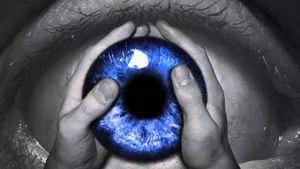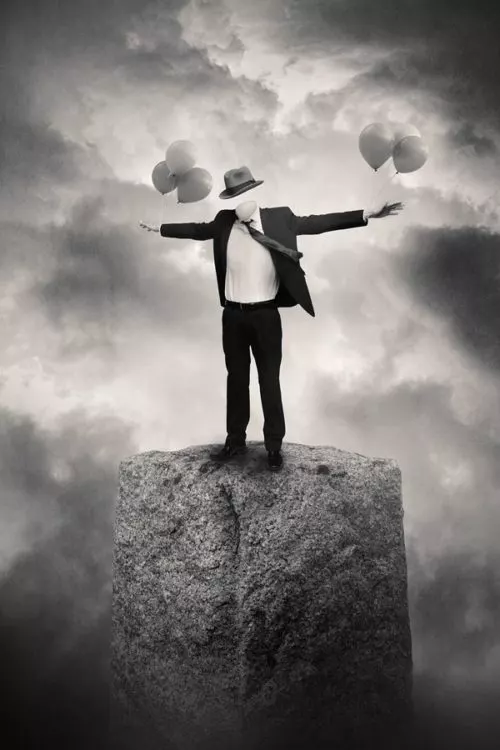“The alternative is unconsciousness, the default-setting, the “rat race” — the constant gnawing sense of having had and lost some infinite thing.” ~ David Foster Wallace
Constantly outflanked by the juggernaut of the status quo, we get caught up in the daily grind of maintaining our tiny comfort zones.
At the expense of adventure and creativity, at the expense of regaining “some infinite thing,” we cling to safety and security. At the expense of unique expression, we give into the hype of being a well-adjusted cog in the cultural clockwork.

But there are ways to break the mundane cycle. There are ways to flip the script and rewrite it. There are ways to turn the tables on a system that constantly seeks to corral us in.
For self-expression, for adventure, for passion, for a life well-lived, here are three ways to escape the default setting.
1) Practice self-inflicted philosophy
“A philosophy of life is something that we all need, and something we all develop, consciously or not. Some people simply import wholesale whatever framework for life they acquire from a religion. Others make up their own philosophy as they go along.” ~ Massimo Pigliucci
Philosophy should serve as a chisel for the hardened beliefs within us. Philosophy, the love of wisdom (more precisely, the science of questioning), helps us discover the way things are connected despite what we’ve been taught.
Questioning what we think we know diminishes the broadcast of the codependent ego so that we can tune into the broadcast of the interdependent whole.
If wisdom is what we’re seeking, then the interdependent whole is a good place to start. If our goal is to get out of the rat race, to transcend the stagnant status quo and to overcome the default setting, then questioning what we’ve been taught is a good first step.
Rather than importing wholesale whatever framework for life the codependent status quo programmed and conditioned us to accept, we use self-inflicted philosophy to discover an interdependent, self-evolving philosophy as unique as our own fingerprint.
Self-inflicted philosophy takes philosophizing to the next level. It self-actualizes. It deconstructs meaning. It self-interrogates worldviews. It’s self-overcoming.
It teaches us how to stand on the shoulders of giants so that we can gaze farther into the interdependent whole. It teaches us how to be relentless in our questioning, how to be ruthless in our circumspection, and how to self-overcome so as not to be overwhelmed by the tribe.
More importantly, it helps us discover our most authentic self by providing a flexible yet fierce way of being and becoming human in the world.
2) Resolve the comfort/courage paradox
“It matters how well you lived, not how long. And often the “well” lies in not living long.” ~ Seneca
Once we have imaginatively questioned the status quo, we liberate ourselves to be proactive in our engagement with the interdependent whole. We free ourselves to take further leaps of courage into the unknown. We set ourselves up to stretch our comfort zone indefinitely.
 But a curious paradox arises between comfort and courage. There’s a fine line between bravery and stupidity, between adventure and catastrophe, between strategic risk and careless attempt.
But a curious paradox arises between comfort and courage. There’s a fine line between bravery and stupidity, between adventure and catastrophe, between strategic risk and careless attempt.
Risk is inherently involved when one seeks to overcome default settings or stretch comfort zones.
As Brené Brown said, “We can choose courage or we can choose comfort, but we can’t have both.”
But there’s nothing saying we cannot be strategic about it. There’s nothing saying we cannot reconcile our shadow before walking into the shadows. Hence the reason why self-inflicted philosophy is the first step. Sure, there’s risk. Sure, we could die young attempting something we love. Sure, our adventure could overwhelm us and change us in ways that we couldn’t imagine.
It’s our own dilemma to resolve. It’s our own paradox to solve. And only we can do it. Nobody else can do it for us. It’s ours alone to reconcile. But leaning more toward risk-taking and less toward risk-aversion seems to be the sounder strategy. Even at the expense of dying young.
Strategic self-questioning comes in handy once again. Live to a ripe old age clinging to comfort and safety, or risk dying young stretching comfort zones and having adventures?
Sure, we’d all rather the ideal scenario of stretching comfort zones and having adventures and somehow surviving to a ripe old age, but we’ll never know either way if we don’t give it a shot. So we might as well give it a shot. Overcome the default setting. Fear of death be damned.
3) Take the Hero’s Journey
“Play! Invent the world! Invent reality!” ~ Vladimir Nabokov
Distort reality and then recreate it. Create your own map of meaning and then loosely follow it. Get lost in the Desert of the Real and then come back with magic elixir that enlivens the tribe.
When we escape the default setting, we set up spaces where Flow states are possible. We set up stages where the art of a life well-lived can be acted upon. We make possibility possible.

Taking the Hero’s Journey is the epitome of a life well-lived. Win or lose. Adapt and overcome or crash and burn. Living long or dying young. Either way, if it happens while in the adventurous throes of a Hero’s journey, it’s a win.
The only way to lose is to forever remain stuck in the default setting. To forever be ground down by the daily grind. To forever chase the tails of other rats in the rat race. To forever conform to being just another cog in the congested clockwork of the man-machine.
The only way to win is to consistently escape the default setting. To question the lot. To take risks. To create Flow States. To understand that default settings, like comfort zones, are good for regrouping and licking wounds, but not at all good for self-expansion, growth, adventure, or a life well-lived.
We win by becoming our own hero on our own journey. By discovering our most authentic, interdependent self through the trials and tribulations of questioning our conditioned, codependent self to the nth degree.
By resolving our addiction to comfort through our development of courage. By creating a sacred space where the expansion and retraction of our comfort zone is free to grow and to breathe us into further self-expansion.
We win by getting out of our own way and by allowing the journey to be the thing. We lose when we never allow the journey to begin in the first place.
As the Buddha profoundly stated, “There are two mistakes one can make along the road to Truth: Not going all the way, and not starting.”
Image source:
Conformity
Surrealist Photography by Chaosophy
Reality Rearranged (1) by Tommy Ingberg
Reality Rearranged (2) by Tommy Ingberg



